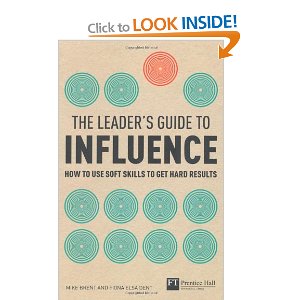The Leader’s Guide to Influence
How to use soft skills to get hard results by Mike Brent & Fiona Elsa Dent
This book is on CMI’s Book of Year Short List announced in October 2011 and the winner will be announced on 6th February 2012. Here’s an extract to whet your appetite:-
Create powerful working relationship and become a more influential leader
Creative effective working relationships is one of the most powerful ways to get things done at work. People skills are often described as “soft skills”, but there’s nothing soft about the impact they can have on your business performance. As a manager or leader, using your influence positively, working others and getting things done through other people is critical to delivering your business objectives. This book shows you how to step up your people skills to get the results you want.
The Leader’s Guide to Influence will help you to understand the most critical aspects of managing your relationships at work, including influence, communication, engagement and trust. It will give you the tools and techniques to use this understanding confidently and effectively to get things done.
Through a combination of ground rules, self-evaluation, practical exercises, case studies and no-nonsense advice, The Leader’s Guide to Influence shows you how to:
- Increase your impact and crate the right impression on others
- Gain greater awareness of your own communication style and approach
- Tailor your management style to work effectively with different types of people
- Communicate more effectively in a wide range of situations
- Build high quality networks
- Understand your colleagues and direct reports better
- Put things right if relationships go off track
- Listen and question effectively
- Give better feedback
- Develop rapport and empathy
- Bring honesty, integrity and authenticity to your relationships.









